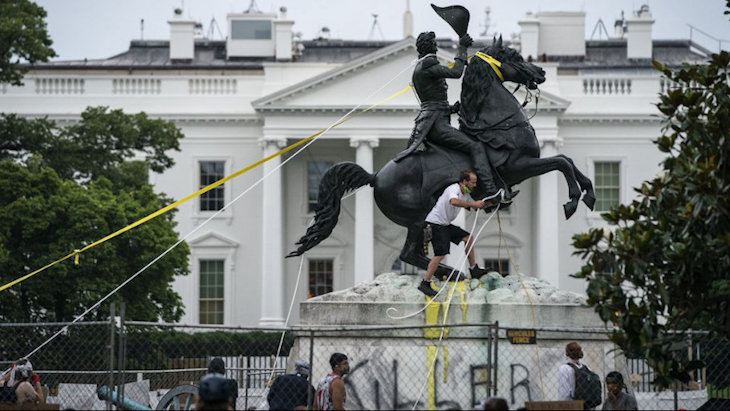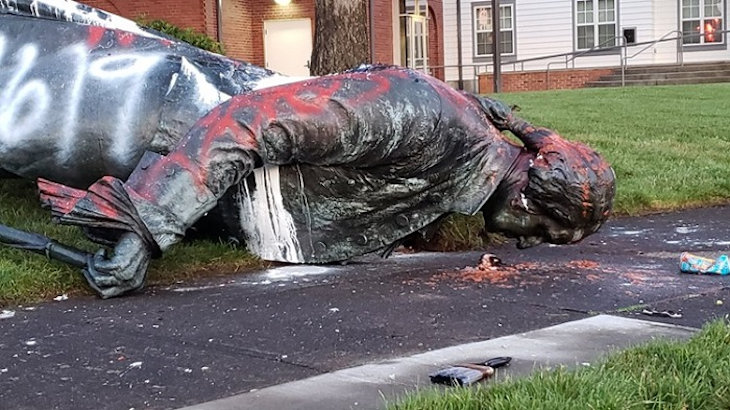 Raise a Glass to Freedom
Raise a Glass to Freedom


9 min read
It has become tempting to reduce historical figures to a single, defining, negative characteristic. It's also false.
Alan Hurwitz died of Covid-19 on June 6. He was 79, and just a few weeks earlier had been granted a compassionate release from the federal prison in Butner, N.C., where the disease was spreading rapidly among the inmates. He had served 10 years of a 17½-year sentence for armed robbery. It wasn’t his first long stint behind bars: After a string of bank robberies in the 1990s, he was convicted and sent to prison for 12 years.
I’d never heard of Hurwitz until coming across his obituaries last week. The New York Times published one on June 15, and the JTA news service ran another a few days later. There was much more to the man, it turned out, than knocking over banks.
“Alan Hurwitz led a complicated life,” wrote Sam Sokol in the JTA obit.
He was a dedicated anti-racism activist who spent years advocating for desegregation. He was a military reserve veteran who became a middle school teacher…
He served in the U.S. Marine Corps Reserve before completing a degree at Wayne State and starting a career as a middle school English and social studies teacher.
Hurwitz worked hard to advance the cause of racial equality, serving on a commission to desegregate the Detroit public school system and taking on a leading role in the Peace Corps in Kenya.
It was an addiction to crack cocaine that led to his downward spiral into crime, and he apparently turned to robbing banks with the same determination he had brought to his efforts to advance social justice. The tragedy of Hurwitz’s life was self-inflicted, and there seems little reason to doubt that he deserved the prison time he was sentenced to. Hurwitz was a bank robber – and yet anyone who described him as just a bank robber would clearly be telling a lie.
I found it especially meaningful to read Hurwitz’s obituaries at this moment. They offered a tiny reminder of human complexity amid our national eruption of unforgiving reductionism, when so many people have no interest in nuance and are intent on labeling everything and everyone according to a blunt litmus test – ally or foe, racist or antiracist, woke or deplorable.
I set out some of my thoughts on the recent wave of statue-toppling and monument-vandalizing in a recent column, but Hurwitz’s obituaries have me thinking about the subject again – especially about how false it is, yet how tempting it has become, to reduce historical figures to a single, defining, negative characteristic.
In Portland, Ore., last week, a statue of George Washington was pulled down by vandals, after they wrapped its head in an American flag and set it on fire. A couple days earlier, a different Portland crowd toppled a statue of Thomas Jefferson , cheering as the image of the man who wrote the Declaration of Independence was attacked with an axe and painted with the words “slave owner.” Portland wasn’t alone in trashing these great American founders. In Chicago, another Washington statue was covered in graffiti and draped with a Ku Klux Klan hood. And in New York City, members of the city council, including the council speaker, have demanded that a statue of the nation’s third president be removed from City Hall.
Washington and Jefferson were among the most singular, visionary, and inspiring leaders in US history. Without them, there would have been no American Revolution, no United States, no “We hold these truths to be self-evident: that all men are created equal.” There would have been no model for other nations of the progress that is possible when government is secured by the consent of the governed. Why would anyone who loves what is best about this country overturn and deface their statues?
The vandals’ answer is not just that Washington and Jefferson owned slaves. It is that nothing else about them matters more.
Let’s agree that the two founding fathers’ connection to slavery was an abominable moral failing. Let’s agree that it was their worst moral failing. Does it follow that everything else they accomplished in their lives pales to insignificance by comparison? That their extraordinary contributions to the creation of the United States – the world’s first democratic republic to be “conceived in liberty,” as Lincoln said, “and dedicated to the proposition that all men are created equal” – are entitled to no recognition or honor?
Would any one of the vandals in Portland, or the city councilors in New York, want to be judged by a similar standard – remembered only for the most shameful thing they ever did, and never looked up to for the good they accomplished?
 A statue of George Washington was toppled and defaced by vandals in Portland, Ore.
A statue of George Washington was toppled and defaced by vandals in Portland, Ore.
Those who erected the statues of Washington and Jefferson knew perfectly well that they had owned slaves. Everyone has always known that about them. And they themselves struggled with their involvement in human bondage.
On multiple occasions, Washington spoke of his growing philosophical opposition to slavery. “I can only say that there is not a man living who wishes more sincerely than I do, to see a plan adopted for this abolition of [slavery],” he wrote to a friend in 1786 . To another he wrote of his commitment never again to buy a slave. In his will, he directed that everyone enslaved by him be freed after his wife’s death; as it turned out, Martha Washington emancipated all of them within a year of her husband’s demise.
As for Jefferson, he was attacked for his entanglement with slavery during his lifetime; his political opponents made much of his relationship with Sally Hemings, and it has been a blot on his record for more than two centuries.
Yet though he held slaves, Jefferson was anything but an advocate of slavery, as Noah Rothman writes in Commentary:
He was not just the author of one of the most expansive definitions of what constitutes human liberty up to that point in history – a radical document that paved a paradigmatic road to Emancipation – [but also] practiced this philosophy. Jefferson was the author of a law that served as the basis for the first anti-slavery legislation in America: the 1787 Northwest Ordinance. In a message to Congress as president, he wrote that “the morality, the reputation, and the best of our country have long been eager to proscribe” slavery. Like men of his time and many generations after, Jefferson regarded blacks as inferior. And yet, he resented the “unremitting despotism” and “degrading submissions” American slaves endured.
In his Notes on the State of Virginia , Jefferson famously wrote, apropos of American slavery: “I tremble for my country when I reflect that God is just.” In his original draft of the Declaration of Independence, he included a clause condemning African slavery – and was dismayed when the Continental Congress struck it from the final version. Nevertheless, what remained packed a powerful moral punch. Martin Luther King, Jr., in his magnificent “I Have a Dream” speech in 1963 , appealed to the moral authority of Jefferson’s lapidary words in the Declaration, regarding them not as evidence of hypocrisy but of a promise to which America should be held:
We've come to our nation's capital to cash a check. When the architects of our republic wrote the magnificent words of the Constitution and the Declaration of Independence, they were signing a promissory note to which every American was to fall heir. This note was a promise that all men, yes, black men as well as white men, would be guaranteed the “unalienable Rights” of “Life, Liberty and the pursuit of Happiness.” It is obvious today that America has defaulted on this promissory note, insofar as her citizens of color are concerned. Instead of honoring this sacred obligation, America has given the Negro people a bad check, a check which has come back marked “insufficient funds.”
But we refuse to believe that the bank of justice is bankrupt. We refuse to believe that there are insufficient funds in the great vaults of opportunity of this nation…
I have a dream that one day this nation will rise up and live out the true meaning of its creed: “We hold these truths to be self-evident, that all men are created equal.”
It would have appalled MLK to see Jefferson’s statue knocked to the ground and defaced so crudely. It should appall anyone who cares about truth, or who understands that there is almost always more to human events and the men and women who shape them than a one-dimensional morality play.
#Alan Hurwitz should also be remembered for his best. Shouldn’t George Washington and Thomas Jefferson? Shouldn’t we all?
“Do you think for one moment,” asks Rothman, “that the generations that follow ours won’t perceive us to be monsters deserving of infamy? Surely, no one who sees this vandalism as a virtue has given a second thought to how history will judge them.”
Indeed. Who knows what political, ideological, or moral sins might be looked back upon, a generation or two down the road, as a permanent disqualification from any kind of honor or historical respect?
There are some men and women who are so truly monstrous, or who devote their lives to so hideous a cause , that everything else in their lives really does dwindle to insignificance by comparison. But most of us aren’t in that category. We are a mixture of noble and base – at times little better than animals, at other times only a little lower than the angels. It is usually a grave injustice to judge human beings solely by their gravest lapses, especially when much of what they did was honorable and worthy.
At his worst, Alan Hurwitz was a bank robber, but he should be remembered as well for his best. Shouldn’t George Washington and Thomas Jefferson? Shouldn’t we all?
This op-ed originally appeared in “Arguable,” a weekly newsletter written by Boston Globe columnist Jeff Jacoby.
